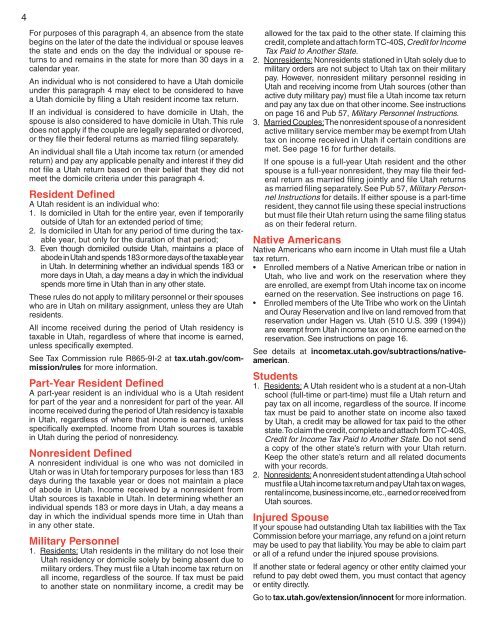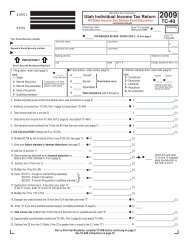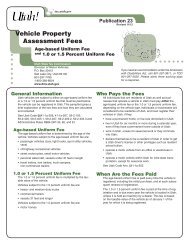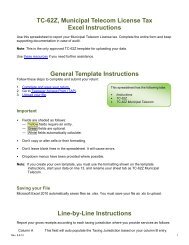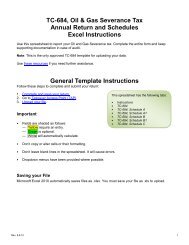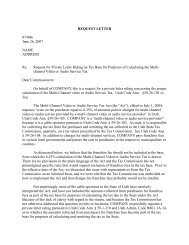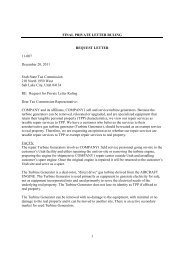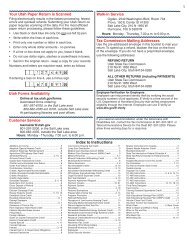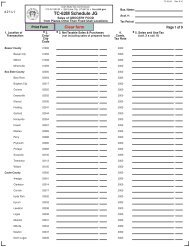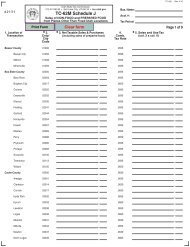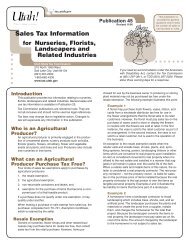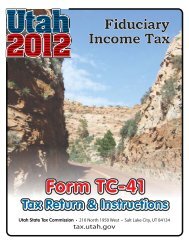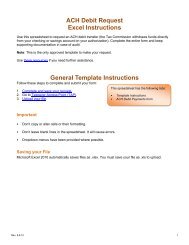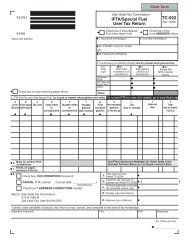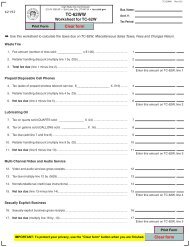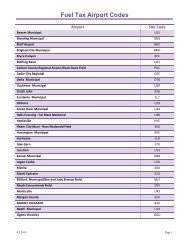TC-40 Instructions - Utah State Tax Commission - Utah.gov
TC-40 Instructions - Utah State Tax Commission - Utah.gov
TC-40 Instructions - Utah State Tax Commission - Utah.gov
Create successful ePaper yourself
Turn your PDF publications into a flip-book with our unique Google optimized e-Paper software.
4<br />
For purposes of this paragraph 4, an absence from the state<br />
begins on the later of the date the individual or spouse leaves<br />
the state and ends on the day the individual or spouse returns<br />
to and remains in the state for more than 30 days in a<br />
calendar year.<br />
An individual who is not considered to have a <strong>Utah</strong> domicile<br />
under this paragraph 4 may elect to be considered to have<br />
a <strong>Utah</strong> domicile by fi ling a <strong>Utah</strong> resident income tax return.<br />
If an individual is considered to have domicile in <strong>Utah</strong>, the<br />
spouse is also considered to have domicile in <strong>Utah</strong>. This rule<br />
does not apply if the couple are legally separated or divorced,<br />
or they fi le their federal returns as married fi ling separately.<br />
An individual shall fi le a <strong>Utah</strong> income tax return (or amended<br />
return) and pay any applicable penalty and interest if they did<br />
not fi le a <strong>Utah</strong> return based on their belief that they did not<br />
meet the domicile criteria under this paragraph 4.<br />
Resident Defi ned<br />
A <strong>Utah</strong> resident is an individual who:<br />
1. Is domiciled in <strong>Utah</strong> for the entire year, even if temporarily<br />
outside of <strong>Utah</strong> for an extended period of time;<br />
2. Is domiciled in <strong>Utah</strong> for any period of time during the taxable<br />
year, but only for the duration of that period;<br />
3. Even though domiciled outside <strong>Utah</strong>, maintains a place of<br />
abode in <strong>Utah</strong> and spends 183 or more days of the taxable year<br />
in <strong>Utah</strong>. In determining whether an individual spends 183 or<br />
more days in <strong>Utah</strong>, a day means a day in which the individual<br />
spends more time in <strong>Utah</strong> than in any other state.<br />
These rules do not apply to military personnel or their spouses<br />
who are in <strong>Utah</strong> on military assignment, unless they are <strong>Utah</strong><br />
residents.<br />
All income received during the period of <strong>Utah</strong> residency is<br />
taxable in <strong>Utah</strong>, regardless of where that income is earned,<br />
unless specifi cally exempted.<br />
See <strong>Tax</strong> <strong>Commission</strong> rule R865-9I-2 at tax.utah.<strong>gov</strong>/commission/rules<br />
for more information.<br />
Part-Year Resident Defi ned<br />
A part-year resident is an individual who is a <strong>Utah</strong> resident<br />
for part of the year and a nonresident for part of the year. All<br />
income received during the period of <strong>Utah</strong> residency is taxable<br />
in <strong>Utah</strong>, regardless of where that income is earned, unless<br />
specifi cally exempted. Income from <strong>Utah</strong> sources is taxable<br />
in <strong>Utah</strong> during the period of nonresidency.<br />
Nonresident Defi ned<br />
A nonresident individual is one who was not domiciled in<br />
<strong>Utah</strong> or was in <strong>Utah</strong> for temporary purposes for less than 183<br />
days during the taxable year or does not maintain a place<br />
of abode in <strong>Utah</strong>. Income received by a nonresident from<br />
<strong>Utah</strong> sources is taxable in <strong>Utah</strong>. In determining whether an<br />
individual spends 183 or more days in <strong>Utah</strong>, a day means a<br />
day in which the individual spends more time in <strong>Utah</strong> than<br />
in any other state.<br />
Military Personnel<br />
1. Residents: <strong>Utah</strong> residents in the military do not lose their<br />
<strong>Utah</strong> residency or domicile solely by being absent due to<br />
military orders. They must fi le a <strong>Utah</strong> income tax return on<br />
all income, regardless of the source. If tax must be paid<br />
to another state on nonmilitary income, a credit may be<br />
allowed for the tax paid to the other state. If claiming this<br />
credit, complete and attach form <strong>TC</strong>-<strong>40</strong>S, Credit for Income<br />
<strong>Tax</strong> Paid to Another <strong>State</strong>.<br />
2. Nonresidents: Nonresidents stationed in <strong>Utah</strong> solely due to<br />
military orders are not subject to <strong>Utah</strong> tax on their military<br />
pay. However, nonresident military personnel residing in<br />
<strong>Utah</strong> and receiving income from <strong>Utah</strong> sources (other than<br />
active duty military pay) must fi le a <strong>Utah</strong> income tax return<br />
and pay any tax due on that other income. See instructions<br />
on page 16 and Pub 57, Military Personnel <strong>Instructions</strong>.<br />
3. Married Couples: The nonresident spouse of a nonresident<br />
active military service member may be exempt from <strong>Utah</strong><br />
tax on income received in <strong>Utah</strong> if certain conditions are<br />
met. See page 16 for further details.<br />
If one spouse is a full-year <strong>Utah</strong> resident and the other<br />
spouse is a full-year nonresident, they may fi le their federal<br />
return as married fi ling jointly and fi le <strong>Utah</strong> returns<br />
as married fi ling separately. See Pub 57, Military Personnel<br />
<strong>Instructions</strong> for details. If either spouse is a part-time<br />
resident, they cannot fi le using these special instructions<br />
but must fi le their <strong>Utah</strong> return using the same fi ling status<br />
as on their federal return.<br />
Native Americans<br />
Native Americans who earn income in <strong>Utah</strong> must fi le a <strong>Utah</strong><br />
tax return.<br />
• Enrolled members of a Native American tribe or nation in<br />
<strong>Utah</strong>, who live and work on the reservation where they<br />
are enrolled, are exempt from <strong>Utah</strong> income tax on income<br />
earned on the reservation. See instructions on page 16.<br />
• Enrolled members of the Ute Tribe who work on the Uintah<br />
and Ouray Reservation and live on land removed from that<br />
reservation under Hagen vs. <strong>Utah</strong> (510 U.S. 399 (1994))<br />
are exempt from <strong>Utah</strong> income tax on income earned on the<br />
reservation. See instructions on page 16.<br />
See details at incometax.utah.<strong>gov</strong>/subtractions/nativeamerican.<br />
Students<br />
1. Residents: A <strong>Utah</strong> resident who is a student at a non-<strong>Utah</strong><br />
school (full-time or part-time) must fi le a <strong>Utah</strong> return and<br />
pay tax on all income, regardless of the source. If income<br />
tax must be paid to another state on income also taxed<br />
by <strong>Utah</strong>, a credit may be allowed for tax paid to the other<br />
state. To claim the credit, complete and attach form <strong>TC</strong>-<strong>40</strong>S,<br />
Credit for Income <strong>Tax</strong> Paid to Another <strong>State</strong>. Do not send<br />
a copy of the other state’s return with your <strong>Utah</strong> return.<br />
Keep the other state’s return and all related documents<br />
with your records.<br />
2. Nonresidents: A nonresident student attending a <strong>Utah</strong> school<br />
must fi le a <strong>Utah</strong> income tax return and pay <strong>Utah</strong> tax on wages,<br />
rental income, business income, etc., earned or received from<br />
<strong>Utah</strong> sources.<br />
Injured Spouse<br />
If your spouse had outstanding <strong>Utah</strong> tax liabilities with the <strong>Tax</strong><br />
<strong>Commission</strong> before your marriage, any refund on a joint return<br />
may be used to pay that liability. You may be able to claim part<br />
or all of a refund under the injured spouse provisions.<br />
If another state or federal agency or other entity claimed your<br />
refund to pay debt owed them, you must contact that agency<br />
or entity directly.<br />
Go to tax.utah.<strong>gov</strong>/extension/innocent for more information.


